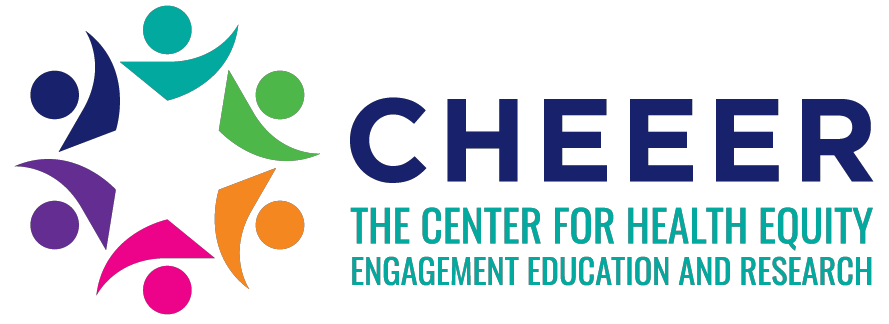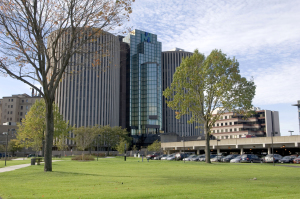Erika Hood, M.Ed., Program Development Manager, Center for Health Equity Engagement Education and Research
The year 2020 brought along the typical excitement and optimism that any new year brings, but little did we know the entire world would be impacted by a global health crisis. Around the world, we relied on health experts and government officials to make decisions that would ensure the health and safely of countries. With a delayed and lackadaisical response to the health crisis, America found itself leading in global COVID-19 cases and a significant amount of deaths, due to the virus. State by state there were vast differences in implemented restrictions with no leading guidance and enforcement.
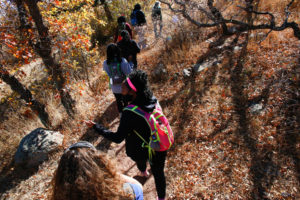
With many essential workers (grocery store, transportation, daycare, retail, fast food workers, etc.) being minority and low-income citizens, we began to see disparities emerge among the African-American community. African-Americans were exposed to and died from the virus at disproportionate rates. That, along with the added stressors of public-school students facing extreme academic setbacks due to virtual learning and loss of income, poor black communities began to carry a much heavier burden.
In May 2020, while the country was slowed to a snail’s pace and many citizens worked from home, the entire world was focused on a horrific video showing yet another black man murdered at the hands of a police officer. The death of George Floyd (along with countless others during this time) fueled a global response of protests calling for the defunding of police and the end of police violence towards African Americans. Our country’s ugly legacy of racial discrimination, oppression, and injustice towards African Americans was on display for the entire world. We called out for acknowledgement and action! The protest, while necessary, added to the stress of the pandemic and it felt like many folks across the globe were at their breaking point. Across multiple Zoom meetings with black colleagues, we acknowledged the anxiety that we carried with us to work and throughout our personal lives. It was as if we were all holding our breath until some unforeseen moment when we were able to release it.
We looked around for outlets to help manage out mental wellness, but opportunities were far less frequent, due to the pandemic.
Summer 2020, while still in a pandemic, offered safe opportunities to get outside and recreate. Now more than ever, folks took to walking, 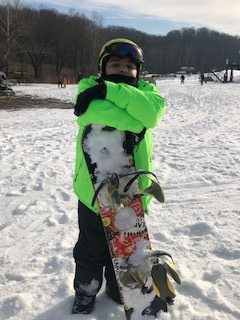 picnicking, running, biking, hiking, kayaking, and paddling, etc. Why on Earth were so many folks outside? Because it feels absolutely amazing. The weather was great, and the risk was low. However, in a city as diverse as Cleveland, Ohio, that diversity is not reflected in outdoor recreation. There are few places where African Americans can feel safe. Folks have been killed while worshipping in church, while laying in bed sleep, while eating ice cream on the couch, and while taking a neighborhood jog. As a community of people, we are often hypervigilant in spaces where a white peer would not be. This includes being outside in nature…dare I mention Christian Cooper? African-Americans have a unique relationship with nature. 400 years ago, Africans were enslaved and used for their superior knowledge of land and agriculture. Their relationship with nature shifted from love and respect to a traumatic and arduous centuries long entanglement. From enslavement to traveling the Underground Railroad to lynching and beatings to being murdered while jogging and having the cops called on you while birding our relationship with “outside” is very complicated. The fear and reserve are justifiable, but the benefits are crucial to both our physical and mental health. A recent article from Kaiser Health News, titled “Black Women Find Healing (But Sometimes Racism, Too) in the Outdoors”, highlighted some of the issues and barriers the group is facing in their effort of trying to live healthier lives.
picnicking, running, biking, hiking, kayaking, and paddling, etc. Why on Earth were so many folks outside? Because it feels absolutely amazing. The weather was great, and the risk was low. However, in a city as diverse as Cleveland, Ohio, that diversity is not reflected in outdoor recreation. There are few places where African Americans can feel safe. Folks have been killed while worshipping in church, while laying in bed sleep, while eating ice cream on the couch, and while taking a neighborhood jog. As a community of people, we are often hypervigilant in spaces where a white peer would not be. This includes being outside in nature…dare I mention Christian Cooper? African-Americans have a unique relationship with nature. 400 years ago, Africans were enslaved and used for their superior knowledge of land and agriculture. Their relationship with nature shifted from love and respect to a traumatic and arduous centuries long entanglement. From enslavement to traveling the Underground Railroad to lynching and beatings to being murdered while jogging and having the cops called on you while birding our relationship with “outside” is very complicated. The fear and reserve are justifiable, but the benefits are crucial to both our physical and mental health. A recent article from Kaiser Health News, titled “Black Women Find Healing (But Sometimes Racism, Too) in the Outdoors”, highlighted some of the issues and barriers the group is facing in their effort of trying to live healthier lives.
In 2009, my mother (Marcia), sister (Ebony) and I created an organization called Syatt. Our original goal was to introduce black and brown youth to non-traditional sports. African-Americans and the latinx population are historically underrepresented in the sports that we choose to be a part of our programming. We wanted to focus on introducing youth to skiing, rowing, scuba diving, biking, rock-climbing, etc. We chose these sports because of the lack of black and brown representation. We knew that in order to begin to change the narrative, we had to address the situation in two ways.
- Address cultural barriers to being outside in nature
- Normalize our presence in “white spaces” created a shift to “our spaces”
How do we begin to change the narrative? Our programming emphasizes the message that “We belong here!” not only to the white majority, but we must believe it within our own community. Over the years of introducing black and brown families to these sports, we’ve had inquisitive folks ask us, “What charity are you from?” or, “Are you all with a school?” I would burn inside when I heard these questions because it suggested that those were the only acceptable reasons that a bus full of inner-city black folks should be a ski resort. Today my reply is simply, “We are out here enjoying the slopes like everyone else!” or “It’s a beautiful day to kayak, so we thought we’d join everyone else!” Many African Americans distance themselves from skiing, kayaking, camping, rowing, etc… saying that it’s not what “WE” do. It is time to bury that assumption. If we continue to think that way, we will miss out on the remarkable healing properties of nature and further pull away from our ancestral roots.
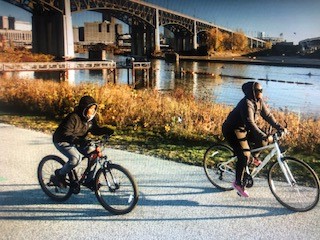
We will continue to be present and normalize black faces in outdoor spaces…normalize using nature as a prescription to heal toxic stress and trauma…normalize outdoor recreation. I used to think nature/outdoor enthusiasts were a bit crazy and obsessive, but now I get it. I recognize how my body reacts to fresh air, sunshine, waterfalls, mountain landscapes, a trail hike, a calm paddle, a walk around a city block…I feel the tension leaving my shoulders and my breathing becoming deeper. If just for a moment, an hour, a day, you will experience relief! And the beauty of it all? There is more than enough to go around. We can ALL experience it!
For more information about Syatt, visit syattcle.org or on Facebook, Twitter, and Instagram.
